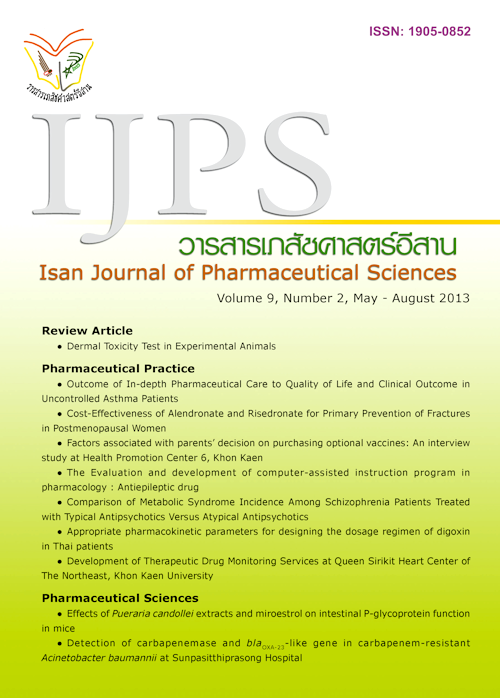Outcome of In-depth Pharmaceutical Care to Quality of Life and Clinical Outcome in Uncontrolled Asthma Patients
Main Article Content
Abstract
Introduction: The Asthma Clinic at Banphai Hospital was established in 2004. However, the majority of the patients were found to be suffering from uncontrolled asthma. Therefore, a new approach to service in the Asthma Clinic was found to be necessary. Materials and Method: The study is evaluate the quality of life and clinical outcome before and after in-depth pharmaceutical care of patients with uncontrolled asthma. The study, through a pretest-posttest experimental design was carried on a group patients over the age of 15 years, who for at least the past 6 months had an uncontrolled level of asthma as per the 2009 guidelines of the Global Initiative for Asthma (GINA). Patients participating in the study were given an in-depth pharmaceutical care depending on a patient’s individual needs. Clinical outcome were measured every 2 months and patients with continued uncontrolled asthma were visited at home by a multidisciplinary team within 7 days for further care for the next six month period. Quality of Life was measured using the MiniAsthma Quality of Life Questionnaire (MiniAQLQ), Thai version. Results: A total of 46 patients were recruited, mostly female (58.7%), majority non-smoking (71.7%), and mean age 59.4 years. After in-depth pharmaceutical care, the overall average quality of life was increased from 4.00 ± 0.95 to 5.04 ± 0.88 points (p<0.001) and increased significantly in every dimension; the number of uncontrolled asthmatic patients decreased from 46 (100%) to 19 patients (41.3%) (p<0.001), the average lung function as measured by PEFR increased from 58.5 ±23.3% to 66.2±24.3% (p<0.001), and the of patients who visited the emergency department and/or had hospital admission was decreased (p=0.439 and p=0.317 respectively). Conclusion: The in-depth pharmaceutical care to uncontrolled asthmatic patients can improve the quality of life and clinical outcome.
Article Details
In the case that some parts are used by others The author must Confirm that obtaining permission to use some of the original authors. And must attach evidence That the permission has been included
References
Abdelhamid E., Awad A., Gismallah A. Evaluation of a hospital pharmacy-based pharmaceutical care services for asthma patients. Pharmacy Practice. 2008; 6 (1), 25-32.
Apter J., Wang X., Bogen D., et al. Problem solving to improve adherence and asthma outcomes in urban adults with moderate or severe asthma: A randomized controlled trial. J Allergy Clin Immunol. 2011; 128 (3), 516-23.
Barnes P., Adcock I. How Do Corticosteroids Work in Asthma?. Ann Intern Med. 2003; 139 (5), 359-70.
Barnes P. Corticosteroid Resistance in Airway Disease. Proc Am Thorac Soc. 2004; 1, 264-8.
Daungdee A. Outcomes of an Easy Asthma Clinic, Banphai Hospital, Khon Kaen Province. jhsr. 2007; 1(2).
Dejsomritrutai W, Marane K, Maneechotesuwan K, et al. Reference spirometric values for healthy life time nonsmokers in Thailand. J Med Assoc Thai. 2000; 83, 457-66.
Gamble J., Stevenson M., Heaney G. A study of a multi-level intervention to improve non-adherence in difficult to control asthma. Respir Med. 2011; 105, 1308-15.
Global Initiative for Asthma. Global Strategy for Asthma Management and Prevention Update 2009 [Online]. [Cited 2010 Dec, 19]. Available from: www.ginasthma.org
Hammerlein A., Muller U., Schulz M. Pharmacist-led intervention study to improve inhalation technique in asthma and COPD. J Eval Clin Pract. 2011; 17 (1), 61-70.
Juniper E. Development and validation of the Mini Asthma Quality of Life Questionaire. Eur Respir J. 1999; 14, 32 – 8.
Juniper E. Mini Asthma Quality of Life Questionnaire (MiniAQLQ); Self – Administratered, Thai version; 1996 Jul.
Kongmuang P. Outcomes of Home Care Monitoring in Asthmatic patients by Pharmacist. 2008. Thesis for master of pharmacy. Chulalongkorn University.
Kritikos V., Armour C., Bosnic-Anticevich S. Interactive Small-Group Asthma Education in the Community Pharmacy Setting: A Pilot Study. Journal of Asthma. 2007; 44(1), 57-64.
Lertsinudom S., Boonsawat W., Samosorn C., et al. Pharmacist’ s Intervention on Managing Drug Related Problems in Easy Asthma Clinic, Srinagarind Hospital. IJPS. 2008; 4(2), 13-23.
Lertsinudom S. Validity and Reliability of the Thai Mini Asthma Quality of Life Questionaire. J Med Assoc Thai. 2010; 93(3), 373 – 7.
Limwattananon C., Saklertsakoon D., Pumas P. et al. Cost-Effectiveness Analysis of Inhaled Corticosteroids for Mild and Moderate Asthma in Thai Health Care Context. IJPS. 2005; 1(2), 30-43.
Mehuys E., Bortel L., Bolle L., et al. Effectiveness of pharmacist intervention for asthma control improvement. Eur Respir J. 2008; 31(4), 790-9.
Oprasertsawat P., editor. Clinical Research. Bangkok: Holistic Publishing; 1995.
Royal Institute of Thailand. [Online]. [Cited 2012 Mar 5]. Available from: http://royin.go.th/th/knowledge/detail.php.?ID=1133
Samosorn C. Outcomes of Pharmaceutical Care for Asthmatic outpatients at Srinakarind Hospital. 2003. Thesis for master of pharmacy. Chulalongkorn University.
Sangphum P. Outcomes of Pharmaceutical Care Prior to Physician Visit in Asthma Clinic at Pranungklao Hospital. 2009. Thesis for master of pharmacy. Silpakorn University.
Thai thoracic. Guidelines for diagnosis and treatment of Asthma Disease in Thailand for Adult Patients 2004. Bangkok: Exit Expression Idea; 2004.
The Asthma Foundation of Thailand. [Online]. [Cited 2012 Oct 9]. Available from: http://www.asthma.or.th
Wikipedia. Asthma [Online]. 2010 [Cited 2010 Nov 8]. Available from: http://en.wikipedia.org/wiki/Asthma
World Health Organization (WHO). Asthma [Online]. 2010 [Cited 2010 Nov 17]. Available from: http://www.who.int/topics/asthma/en/


